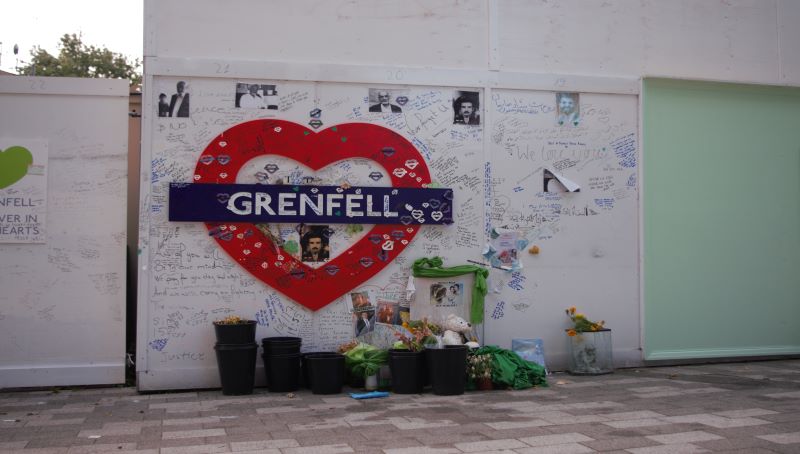
By Danielle Aumord
The Grenfell Tower fire that killed 72 people was a ‘human rights disaster’ that was caused partly by the Royal Borough of Kensington and Chelsea (RBKC) and Kensington and Chelsea Tenant Management Organisation’s ‘disrespect for human dignity’, heard the inquiry into the tragedy.
Lawyers representing residents told the public inquiry: ‘RBKC and KCTMO were joined in seeing this refurbishment as an act of municipal generosity, not critical and long overdue investment, but a gift.’
Council representatives have even admitted in recent inquiry hearings that a ‘mindset’ existed within the borough that meant Grenfell residents were ‘not listened to as much as they should have been’ before the fatal fire.
Lawyers of the bereaved families and survivors have concluded that government fire polices, including localism, deregulation, and austerity, resulted in ‘an abdication of responsibility’ by the British state leading to ‘disastrous consequences’.
Danny Friedman QC, representing a group of bereaved and survivors, said that austerity cuts were very significant to the blaze at Grenfell, pointing to National Audit Office figures that estimate an average of 28% cuts for fire services across the country and 19.2% in London once council tax was factored in.
‘There’s nothing like a funding cut to render a conservative and slow-to-change organisation that much more conservative and slow to change,’ he said.
The London Fire Brigade (LFB) has also continued to suffer stinging criticism over the management of the Grenfell fire. The inquiry heard that firefighters at the scene had significant trouble contacting commanders on the ground on the night of the blaze. One firefighter even said that the equipment was ‘from the dark ages’; that it was impossible to use radios above the 15th floor of the tower because of reception ‘blind spots’.
In a post-Grenfell review, the fire brigade put the communication issues down to a spike in the number of people using the radios, but communication systems expert Professor Chris Johnson told the inquiry that the technology used was not tested sufficiently to see if it could cope during a tower block incident.
He also said, in a report to the inquiry, that the LFB are ‘not capable of delivering the role that society expects from it’; that it demonstrated a ‘total disregard for technical competency’; and urgently needs ‘a drastic change of culture.’
The fire brigade said it was in the process of replacing and upgrading the radios it used in incidents in response to the phase one findings of the inquiry.
Initially they plan to deliver a new type of radio which can be used for both the operational area at the scene of a fire and the breathing apparatus. They’re also putting in place new training and policy approaches for firefighters. The second phase of LFB reforms, which aims to complete next year May, will see the implementation of new breathing apparatus that incorporates improved communication capability.
Former senior firefighter Steve McGuirk also took the witness box as an expert witness.
He’s served 39 years in the fire service in Greater Manchester, the West Midlands, and South Yorkshire, and has agreed with criticism from the first phase report that the tower should have been evacuated earlier.
Although there were clearly many difficulties when it came to evacuating the Grenfell Tower – for example, no alarm, no list of residents, and a single staircase flooded with smoke from the fire – Mr McGuirk said that evacuation was ‘still preferable to telling occupants to remain in their flats.’
On the night of the fire, the decision to evacuate wasn’t taken by the firefighters until 2.47am by which time the fire had spread to the top of the building and around much of it. But Mr McGuirk did take note of the fact that there’s ‘no practical guidance in the UK as to how evacuation should be carried out.’
His opinion was that the firefighters at Grenfell were ‘never going to be able to extinguish the fire,’ and that they should have ‘prioritised their resources on rescue as well as limiting the extent of the fire spread.’
The public inquiry also heard that fire commanders failed to obtain information from 999 calls and, as a result, fire fighters inside the tower failed to understand how the fire was behaving.
Professor Torero, a senior civil engineering professor at University College London (UCL) and a world-renowned expert in fire and disasters who has contributed to reviews of events including the collapse of the World Trade Centre buildings in the 9/11 attacks, also gave evidence at the inquiry. His criticisms were more pointed towards the UK’s reliance on ‘stay put’ in the years before Grenfell, which he said was justified with reference to figures which showed of 8,000 fires in high rises, just 22 resulted in an evacuation of more than five people.
These figures appeared in a government-endorsed guide published in 2011, which encouraged a strong reliance on stay put.
Even if the probability of a fire like Grenfell was low, the consequences were ‘massive’, he said, and this meant that it should have been planned for.
The Grenfell public inquiry continues.





